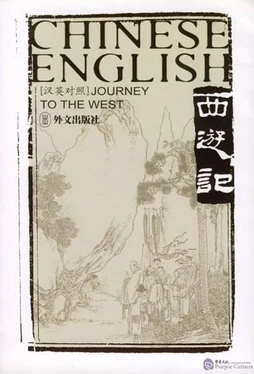If you don't know what the households who still wanted to thank them did at daybreak, listen to the explanation in the next installment.
In the Almsgiver's Garden Antiquity and Causes Are Discussed
In the Court of India the King Meets the Monks
When thoughts arise there surely will be desire,
Longing is certain to lead one to disaster.
Why should intelligence distinguish the three ranks of nobility?
When conduct is complete it naturally returns to the primal sea.
Whether you become an immortal or a Buddha,
All must be arranged from within.
In absolute purity, with all dust removed,
All will be achieved and one will rise to heaven.
The story tells how when Sanzang and his disciples were nowhere to be seen at dawn the monks in the Clouds of Compassion Monastery all said, “We couldn't keep them, we couldn't say goodbye to them, and we weren't able to ask them for anything. We've let those living Bodhisattvas slip clean away.”
As they were talking, some of the great families from the Southern outskirts of the city came in with invitations, at which the monks clapped their hands in regret and said, “We were caught off our guard last night: they all rode off by cloud.” Everyone then kowtowed to heaven in gratitude. The news was spread to all the officials in the city, who told the great families to prepare the five kinds of sacrificial animal, flowers and fruit to offer to the shrines in thanksgiving.
The story tells how the Tang Priest and his three disciples fed on the wind and slept in the open, travelling uneventfully for the best part of a month. One day they suddenly saw a high mountain. “Disciples,” said the Tang Priest in fear, “the ridge in front of us is very steep. You must be very careful.”
“As our journey has brought us so close to the land of the Buddha there will definitely be nothing evil here,” said Monkey. “Don't worry, Master.”
“Disciple,” the Tang Priest replied, “although we are not far from the Buddha's land the monks told us in the monastery the other and they didn't know how much further after that.”
“Have you forgotten the Heart Sutra that the Rook's Nest Hermit taught you again, Master?” asked Monkey.
“The Prajna-paramita Heart Sutra is constantly with me, like my habit and begging bowl,” Sanzang replied. “There has not been a day ever since the Rook's Nest Hermit taught it to me that I have not recited it. I have never forgotten it for a moment. I can even recite it backwards. How could I possibly forget it?”
“You can only recite it, Master,” said Monkey. “You never asked the hermit to explain it.”
“Ape!” retorted Sanzang. “How can you say I don't understand it? Do you understand it then?”
“Yes,” Monkey replied, “I do.”
After that neither Sanzang nor Monkey made another sound. This had Pig falling about with laughter, while Friar Sand was hurting himself, he was so amused.
“Nonsense,” said Pig. “We all started out in life as monsters. We're not Dhyana monks who've heard the sutras being explained or Buddhist priests who've been taught the dharma. He's pretending, just putting on an act. How can you say you understand? Well then, why aren't you saying anything? We're listening. Please explain.”
“Second brother,” said Friar Sand, “leave him be. Big brother's only talking big like that to keep the master going. What he knows about is how to use a cudgel. What does he know about explaining sutras?”
“Stop talking such nonsense, Wuneng and Wujing,” said Sanzang. “Wukong understands the wordless language. That is true explanation.”
As master and disciples talked they did indeed cover a long distance, leaving the ridge behind them. They saw a big monastery beside the road. “Wukong,” said Sanzang. “There's a monastery ahead. Just look at it.
It's neither too big nor too small,
But has green glazed tiles;
Neither too new nor too old,
And with a red wall.
Leaning canopies of azure pines can just be seen:
Who knows how many thousand years old they are?
Listen to the murmur of the waters in the channel,
Cut from the mountain untold dynasties ago.
Above the gates is written,
'Spread Gold Dhyana Monastery';
The tablet is inscribed,
'Ancient relic.'”
Monkey saw that it was called the Spread Gold Dhyana Monastery, and Pig said so too. '“Spread Gold,'“ Sanzang wondered as he sat on his horse, “'Spread Gold'…Can we be in the country of Sravasti?”
“This is very remarkable, Master,” said Pig. “In all the years I've been with you you've never known the way before, but you seem to know it now.”
“No,” Sanzang replied, “I have often read in the scriptures about the Buddha being in the Jetavana garden in the city of Sravasti. The Venerable Almsgiver Sudatta tried to buy it from the prince as a place to ask the Buddha to preach in. The prince refused to sell the garden, and said he would only part with it if it were covered with gold. When the Venerable Almsgiver heard this he had gold bricks made with which he covered the whole garden to buy it. Then he invited the Buddha to preach on the dharma. I am sure that the name Spread Gold Monastery must refer to that story.”
“We're in luck,” said Pig with a smile, “If that story's true we can find ourselves one of those bricks as a present to give people.” Everybody laughed, after which Sanzang dismounted.
As they went in through the monastery gates they saw people carrying loads with shoulder-poles or on their backs, pushing carts, or sitting in loaded carts. Others were sleeping or talking. The sight of the master, who was so handsome, and his three hideous disciples rather frightened them, so they drew back to make way.
Worried that his disciples would provoke trouble, Sanzang kept saying, “Behave yourselves! Behave yourselves!” They were all very restrained. As they went round the Vajra Hall a Dhyana monk of most unworldly appearance came out to meet them:
A face like a shining full moon,
A body like a bodhi tree.
The wind blew through the sleeve round his staff,
As his sandals trod the stony path.
When Sanzang extended a monastic greeting to him the monk returned his courtesy and asked, “Where are you from, teacher?”
“I am Chen Xuanzang,” Sanzang replied, “sent to the Western Heaven at the command of the Great Tang emperor in the East to worship the Buddha and fetch the scriptures. As my journey brings me here I am paying you this hasty visit to request a night's shelter before continuing on my way tomorrow.”
“This monastery of ours is one that receives people from all quarters,” the monk replied. “Everyone is welcome to visit, and we would be especially happy to provide for so holy a monk from the East as your reverend self.” Sanzang thanked him and called to his three disciples to come with him as they crossed the cloister and refectory and went to the abbot's lodgings. When they had exchanged courtesies they sat down as befits host and guests. Monkey and the other two sat down as well, their hands at their sides.
The story tells how, on learning that monks from Great Tang in the East who were going to fetch the scriptures had arrived, all in the monastery, young and old alike, whether permanent inmates, itinerant monks, elders or novices came to see them. After tea had been drunk a vegetarian meal was brought in. While Sanzang was still saying the grace before the meal Pig in his impatience had already grabbed and wolfed down steamed buns, vegetarian dishes and soup noodles. In the crowded abbot's lodgings those who knew better were admiring Sanzang's majestic bearing, while those who enjoyed fun watched Pig eat.
Читать дальше









